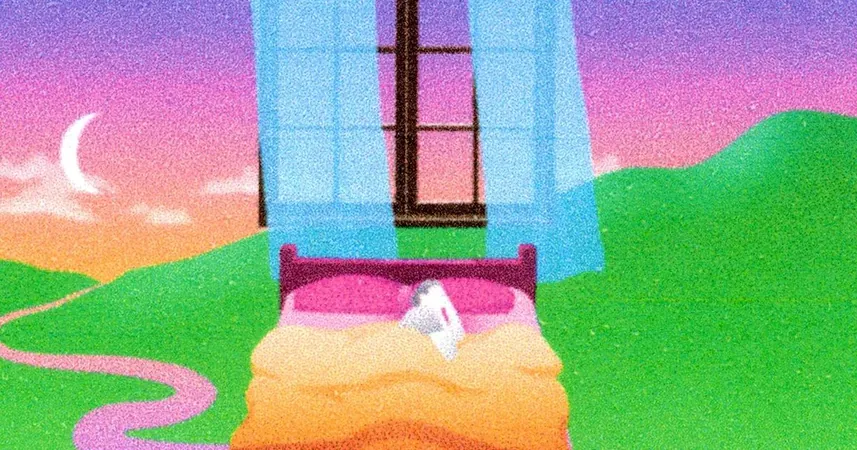
The 6 Sleep Misconceptions That Could Be Keeping You Up at Night
2025-01-25
Author: Arjun
Sleep is undeniably crucial for our overall well-being. Insufficient sleep can elevate the risk of serious health conditions like dementia, high blood pressure, and Type 2 diabetes, alongside making one feel irritable and anxious. In the quest for better sleep, many have turned to trendy solutions such as 'sleepy girl mocktails' and intricate nighttime rituals. However, many of these approaches lack scientific backing and often ignore fundamental issues of sleep hygiene.
Rebecca Robbins, an assistant professor in sleep medicine at Harvard Medical School, emphasizes the need to address widespread misconceptions about sleep. The New York Times consulted 11 sleep specialists to clarify six common myths that persist in public discourse.
1. You Can’t Train Your Body to Need Less Sleep.
Long-term sleep deprivation might make you feel like you’ve adjusted, but this doesn’t mean it’s healthy or sustainable. Dr. Ian Katznelson from Northwestern Medicine points out that while you can adapt to living on less sleep, you can never completely mitigate the negative effects, which include decreasing memory retention, mood fluctuations, and lower creativity. In fact, consistent lack of sleep can lead to chronic health problems over time.
2. More Sleep Isn’t Always Better.
While short sleep duration can have harmful effects, oversleeping can be risky too. A study conducted in 2023, involving almost 500,000 people, unveiled that individuals who sleep over nine hours a night have a 35% higher likelihood of dying from respiratory diseases. Dr. Fariha Abbasi-Feinberg notes that experts are still exploring the connection between excessive sleep and underlying health issues. Generally, adults should aim for 7 to 9 hours of sleep. If you consistently feel the urge for more, consulting a sleep specialist may help diagnose potential conditions like sleep apnea, which leads to poor-quality sleep.
3. You Can’t Make Up for Lost Sleep on the Weekend.
While a slight sleep-in on weekends isn’t harmful, turning it into a long sleep session is usually a sign of chronic sleep deprivation during the week. Dr. Thomas Kilkenny of Northwell Staten Island University Hospital explains the concept of 'sleep debt'—if you're missing hours during the week, catching up on the weekend is rarely successful. To combat this issue, it’s better to aim for consistent sleep throughout your week by gradually adjusting your bedtime, ideally adding 15 minutes earlier each night.
4. Waking Up at Night Isn’t Always a Bad Sign.
Frequent awakenings during the night, while annoying, aren’t inherently alarming. Your body naturally goes through various sleep stages, which can result in brief awakenings. Dr. Jennifer Goldschmied humorously compares unrealistic sleep expectations to a coma rather than actual restorative sleep. If falling back asleep takes over 20 minutes, experts recommend getting out of bed and doing something relaxing until you feel sleepy again.
5. Grogginess After Waking Isn’t Always a Red Flag.
Experiencing some disorientation after waking, referred to as sleep inertia, is common. This phenomenon can last anywhere from 30 minutes to two hours and can be exacerbated by sleep deprivation. Dr. Ann Romaker from the University of Cincinnati reveals that sleep aids can also intensify feelings of grogginess. To alleviate this, a quick morning walk in natural light can help signal your body that it’s time to wake up and shake off that sleepy feeling.
6. Snoring Can Be a Serious Issue.
While many regard snoring as harmless, Dr. Mehwish Sajid warns that loud and frequent snoring may indicate obstructive sleep apnea—a serious condition where throat tissues relax and block airways during sleep. Certain populations, including overweight individuals, older adults, and heavier drinkers, are at higher risk for this condition. Notable symptoms to watch for include choking or gasping during sleep. If you or someone who shares your bed has noticed these types of behaviors, it may indicate a need for professional evaluation.
Understanding these misconceptions about sleep can lead to improved health and well-being. Prioritizing quality sleep isn't just a preference; it’s a necessity!






 Brasil (PT)
Brasil (PT)
 Canada (EN)
Canada (EN)
 Chile (ES)
Chile (ES)
 Česko (CS)
Česko (CS)
 대한민국 (KO)
대한민국 (KO)
 España (ES)
España (ES)
 France (FR)
France (FR)
 Hong Kong (EN)
Hong Kong (EN)
 Italia (IT)
Italia (IT)
 日本 (JA)
日本 (JA)
 Magyarország (HU)
Magyarország (HU)
 Norge (NO)
Norge (NO)
 Polska (PL)
Polska (PL)
 Schweiz (DE)
Schweiz (DE)
 Singapore (EN)
Singapore (EN)
 Sverige (SV)
Sverige (SV)
 Suomi (FI)
Suomi (FI)
 Türkiye (TR)
Türkiye (TR)
 الإمارات العربية المتحدة (AR)
الإمارات العربية المتحدة (AR)